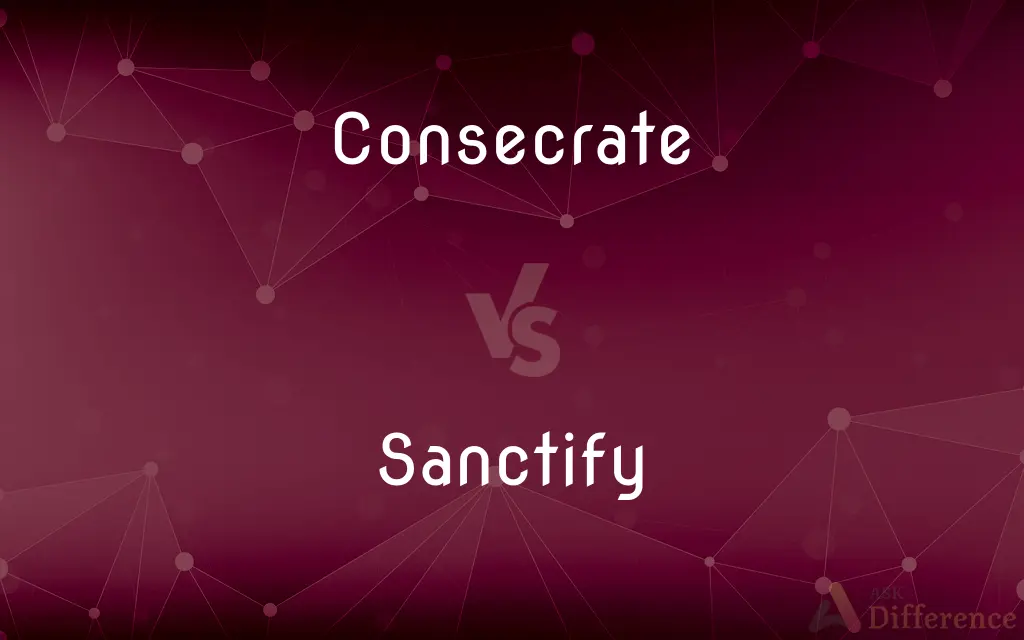Consecrate vs. Sanctify — What's the Difference?
Edited by Tayyaba Rehman — By Urooj Arif — Updated on March 27, 2024
Consecrate emphasizes dedicating something or someone formally for a specific, often religious, purpose, while sanctify involves making something holy through divine intervention or religious rite.

Difference Between Consecrate and Sanctify
Table of Contents
ADVERTISEMENT
Key Differences
Consecrate typically refers to the act of formally declaring or setting aside something or someone for a specific, sacred purpose, often involving a religious or solemn ceremony. This process is about dedication and assignment to a divine or holy function. Whereas, sanctify primarily focuses on the process or state of being made holy or purified. This could involve divine intervention, religious rites, or spiritual cleansing, suggesting a transformation into a state of sanctity or holiness.
While consecration is often associated with objects, places, or people within religious contexts—such as churches, altars, or priests, marking them as dedicated to divine service—sanctification extends to moral and spiritual purification, not just formal dedication. For example, a person's life or behavior can be sanctified, indicating a spiritual or ethical purification and alignment with divine principles.
Consecrate often involves a formal ceremony or rite that marks the beginning of something's holy designation. This ceremonial aspect underscores a specific moment or act of dedication. On the other hand, sanctify can be a process, not just a single event, involving ongoing spiritual growth, ethical purification, or moral improvement over time.
The intention behind consecration is to earmark for divine use or to designate as sacred, often implying a change in status from profane to holy. Sanctify, however, implies a deeper transformation, not just in status but in nature—becoming more aligned with the divine or holy through purification or moral perfection.
Despite these differences, both terms are used interchangeably in many contexts, especially within religious texts and practices. They share the common theme of transformation towards a higher spiritual or religious state, whether through formal dedication (consecrate) or moral and spiritual purification (sanctify).
ADVERTISEMENT
Comparison Chart
Definition
To dedicate formally to a divine or sacred purpose.
To make holy or purify.
Focus
Formal dedication and setting apart for a holy use.
Transformation into a state of holiness.
Contexts
Often objects, places, or persons in religious rites.
Moral and spiritual purification.
Process
Involves a ceremonial act or rite.
Can be an ongoing process or state.
End Result
Designation as sacred or divine.
Becoming aligned with divine or holy principles.
Compare with Definitions
Consecrate
Often pertains to objects, places, or people within religious contexts.
The priest consecrated the new altar for use in the church.
Sanctify
Involves becoming holy or purified, often through divine intervention.
Through prayer and good deeds, the faithful believe they are sanctified.
Consecrate
Involves a formal ceremony or rite.
The church was consecrated by the bishop in a solemn ceremony.
Sanctify
To make something or someone holy or purified.
The process of sanctification is central to many religions.
Consecrate
To earmark for divine use or designate as sacred.
The artifacts were consecrated for the ritual.
Sanctify
Extends to individuals' lives or behaviors.
He sought to sanctify his life through diligent spiritual practice.
Consecrate
To formally dedicate something to a sacred purpose.
The ancient temple was consecrated as a place of worship.
Sanctify
Becoming more aligned with divine or holy principles.
The rituals are believed to sanctify the participants.
Consecrate
Implies a change from profane to holy status.
The ground was consecrated as hallowed during the service.
Sanctify
Can signify continuous spiritual or moral improvement.
The community is on a journey of sanctification.
Consecrate
Appoint to a clerical posts;
He was ordained in the Church
Sanctify
To set apart for sacred use; consecrate
The preacher sanctified the ground as a cemetery.
Consecrate
To declare or set apart as sacred
Consecrate a church.
Sanctify
To make holy; purify
They felt the spirit had descended and sanctified their hearts. They sanctified the body with holy oil.
Consecrate
To sanctify (bread and wine) for Eucharistic use through a ritual regarded by some Christian churches as effecting transubstantiation.
Sanctify
To give religious sanction to, as with an oath or vow
The wedding ceremony sanctifies the marriage.
Consecrate
To initiate (a priest) into the order of bishops.
Sanctify
To give social or moral sanction to
"The only books I wanted to read as a teenager were those sanctified by my elders and betters" (David Eggers).
Consecrate
To dedicate solemnly to a service or goal.
Sanctify
(transitive) To make holy; to consecrate; to set aside for sacred or ceremonial use.
Consecrate
To make venerable; hallow
A tradition consecrated by time.
Sanctify
(transitive) To free from sin; to purify.
Consecrate
Dedicated to a sacred purpose; sanctified.
Sanctify
(transitive) To make acceptable or useful under religious law or practice.
Consecrate
(transitive) To declare something holy, or make it holy by some procedure.
Sanctify
(transitive) To endorse with religious sanction.
Consecrate
To ordain as a bishop.
Sanctify
To make sacred or holy; to set apart to a holy or religious use; to consecrate by appropriate rites; to hallow.
God blessed the seventh day and sanctified it.
Moses . . . sanctified Aaron and his garments.
Consecrate
Consecrated; devoted; dedicated; sacred.
Sanctify
To make free from sin; to cleanse from moral corruption and pollution; to purify.
Sanctify them through thy truth.
Consecrate
Consecrated; devoted; dedicated; sacred.
They were assembled in that consecrate place.
Sanctify
To make efficient as the means of holiness; to render productive of holiness or piety.
A means which his mercy hath sanctified so to me as to make me repent of that unjust act.
Consecrate
To make, or declare to be, sacred; to appropriate to sacred uses; to set apart, dedicate, or devote, to the service or worship of God; as, to consecrate a church; to give (one's self) unreservedly, as to the service of God.
One day in the week is . . . consecrated to a holy rest.
Sanctify
To impart or impute sacredness, venerableness, inviolability, title to reverence and respect, or the like, to; to secure from violation; to give sanction to.
The holy man, amazed at what he saw,Made haste to sanctify the bliss by law.
Truth guards the poet, sanctifies the line.
Consecrate
To set apart to a sacred office; as, to consecrate a bishop.
Thou shalt consecrate Aaron and his sons.
Sanctify
Render holy by means of religious rites
Consecrate
To canonize; to exalt to the rank of a saint; to enroll among the gods, as a Roman emperor.
Sanctify
Make pure or free from sin or guilt;
He left the monastery purified
Consecrate
To render venerable or revered; to hallow; to dignify; as, rules or principles consecrated by time.
Consecrate
Give entirely to a specific person, activity, or cause;
She committed herself to the work of God
Give one's talents to a good cause
Consecrate your life to the church
Consecrate
Dedicate to a deity by a vow
Consecrate
Render holy by means of religious rites
Consecrate
Solemnly dedicated to or set apart for a high purpose;
A life consecrated to science
The consecrated chapel
A chapel dedicated to the dead of World War II
Common Curiosities
How does sanctify differ from consecrate?
Sanctify involves making something holy or purified, often through divine intervention or religious practices, differing from consecration's focus on formal dedication.
Can a person be consecrated or sanctified?
Yes, a person can be both consecrated and sanctified, the former through a formal dedication to divine service, and the latter through spiritual purification and moral improvement.
Is consecration a one-time event?
Consecration usually refers to a specific ceremonial act or rite, making it often a one-time event.
What does it mean to consecrate something?
To consecrate something means to formally dedicate it to a sacred purpose through a ceremony or rite.
What role do ceremonies play in consecration?
Ceremonies are crucial in consecration, marking the formal dedication of something as sacred or divine.
How does sanctification affect individuals?
Sanctification affects individuals by aligning their lives and behaviors with divine or holy principles, aiming for moral and spiritual purification.
Is sanctification an ongoing process?
Yes, sanctification can be an ongoing process of becoming holier or more purified through spiritual growth and moral practices.
Can a place be both consecrated and sanctified?
Yes, a place can be both consecrated through a formal ceremony and sanctified through its association with holy practices or divine presence.
Can the act of consecration also sanctify?
The act of consecration can also lead to sanctification if it involves or results in the purification or making holy of the consecrated item or person.
Can objects be sanctified?
Objects can be sanctified if they are made holy or set apart for religious purposes through prayer or ritual.
What is the significance of consecration in religion?
Consecration holds significant religious importance by setting apart objects, places, or individuals for divine purposes, marking them as sacred.
Can non-religious objects be consecrated or sanctified?
While typically used in religious contexts, non-religious objects can be consecrated or sanctified symbolically, dedicating them to noble or high purposes.
Is sanctification necessary for salvation in Christianity?
In many Christian denominations, sanctification is viewed as an essential aspect of the path to salvation, emphasizing the need for moral and spiritual purity.
How does sanctify relate to personal growth?
Sanctify relates to personal growth by emphasizing spiritual and moral purification, encouraging individuals to align closer with divine principles.
Does sanctification change a person’s nature?
Sanctification is believed to transform a person’s nature, making them holier and more aligned with divine or moral principles.
Share Your Discovery

Previous Comparison
Face vs. Mush
Next Comparison
Equilibrium vs. BalanceAuthor Spotlight
Written by
Urooj ArifUrooj is a skilled content writer at Ask Difference, known for her exceptional ability to simplify complex topics into engaging and informative content. With a passion for research and a flair for clear, concise writing, she consistently delivers articles that resonate with our diverse audience.
Edited by
Tayyaba RehmanTayyaba Rehman is a distinguished writer, currently serving as a primary contributor to askdifference.com. As a researcher in semantics and etymology, Tayyaba's passion for the complexity of languages and their distinctions has found a perfect home on the platform. Tayyaba delves into the intricacies of language, distinguishing between commonly confused words and phrases, thereby providing clarity for readers worldwide.














































